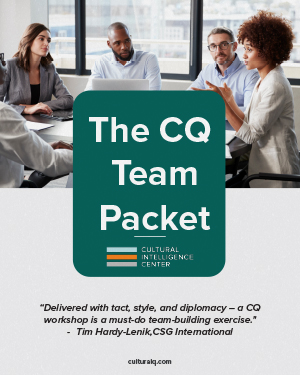Originally posted at amacombooks.wordpress.com
Our struggling economy is hitting human resource professionals as hard as any group I know. I keep hearing from HR directors who complain about sleepless nights and 60-hour workweeks. Many are asked to figure out which employees can be eliminated and which ones are indispensable to the company’s survival and growth. They spend hours every week consoling stressed out employees who want to know if they’re part of the next “right-sizing”, and many additional hours are spent receiving resumes and phone calls from job seekers. Meanwhile, many lay in bed at night wondering about the stability of their own jobs.
A growing number of human resource professionals are tapping into an emerging field of research to help them survive the roller coaster ride of the 2009 work environment—cultural intelligence (CQ). Cultural intelligence is the capability to function effectively across national, ethnic, and organizational cultures. It stems from research across more than 30 countries and it’s proven to enhance the effectiveness of individuals and organizations facing economically challenging times. One of the distinctions of companies that are not only surviving but thriving in the midst of this downturn is they’re using this period to enhance the cultural intelligence of their personnel.
HR professionals were among the earliest adopters of the research and training on emotional intelligence. They realize that the common sense and social skills that come from emotional intelligence play a huge role in an employee’s success and in the performance of the entire organization. Cultural intelligence offers that kind of success when working in cross-cultural situations. It’s one thing to be able to read the emotions of a customer or client from a familiar background but the ability to do so with an individual from a different culture requires an additional skill set—cultural intelligence (CQ).
Similar to other forms of intelligence, cultural intelligence includes four capabilities:
- CQ Drive: One’s interest, confidence, and drive to adapt cross-culturally
- CQ Knowledge: One’s understanding of cross-cultural issues and differences
- CQ Strategy: One’s ability to plan effectively for cultural diverse learners
- CQ Action: One’s adaptability in the midst of cross-cultural teaching and interaction
Growth in these four capabilities needs to begin with HR professionals themselves. They’re the ones who need to be the CQ experts on behalf of the rest of the organization. This will allow them to enhance the cultural intelligence of people all throughout the organization and it provides an important form of assessment when deciding who to retain and when filling vacant positions.
Many organizations have decided every employee needs some degree of cultural intelligence because a customer’s experience is whomever they encounter from the company—whether it’s a c-level executive or a receptionist. But the positions where it’s most important to assess and nurture cultural intelligence are among HR staff themselves, individuals who interact the most with culturally diverse vendors and customers (e.g. sales reps), and senior leaders.
Here are some ways HR professionals are applying cultural intelligence:
- Enhancing their own CQ in order to work with employees coming from a variety of backgrounds.
- Drawing upon CQ to analyze various jobs within the organization and identifying which ones require the strongest degree of cultural intelligence.
- Altering performance appraisals in light of the cultural backgrounds of various personnel (e.g. giving managers tips on how to offer criticism to someone from an Asian background as compared to someone from a Latin background).
- Creating policies that respect cultural difference while still remaining true to the corporate culture and brand (e.g. head coverings for women).
- Offering cultural intelligence training and consulting to employees as part of their professional development.
- Prioritizing cultural intelligence among all new hires by assessing it through a cultural intelligence inventory (See davidlivermore.com/blog/cq).
- Finding better ways to motivate people to participate in diversity training.
- Drawing upon CQ to help bridge the generational divides that exists among many subcultures of an organization.
- Developing training around the four capabilities of CQ (Drive, Knowledge, Strategy, and Action).
- Assessing current and future personnel by interviewing them in light of the four capabilities of CQ.
Employees with high CQ know how to innovate, adapt, and function in and out of a lot of fluctuating markets and circumstances. Even if the position being filled isn’t directly involved with cultural diverse markets, it bodes well for any company to have an eye out for job candidates who demonstrate a growing measure of cultural intelligence. We can all become more culturally intelligent! Education (through training, consulting and/or reading), being part of a multi-cultural team and real live cross-cultural experiences are the best ways to increase your cultural intelligence.
Tap into cultural intelligence to alleviate some of the stress of today’s unpredictable twists and turns. CQ offers you both a tool for survival and a satisfying way to help your team and company succeed.
